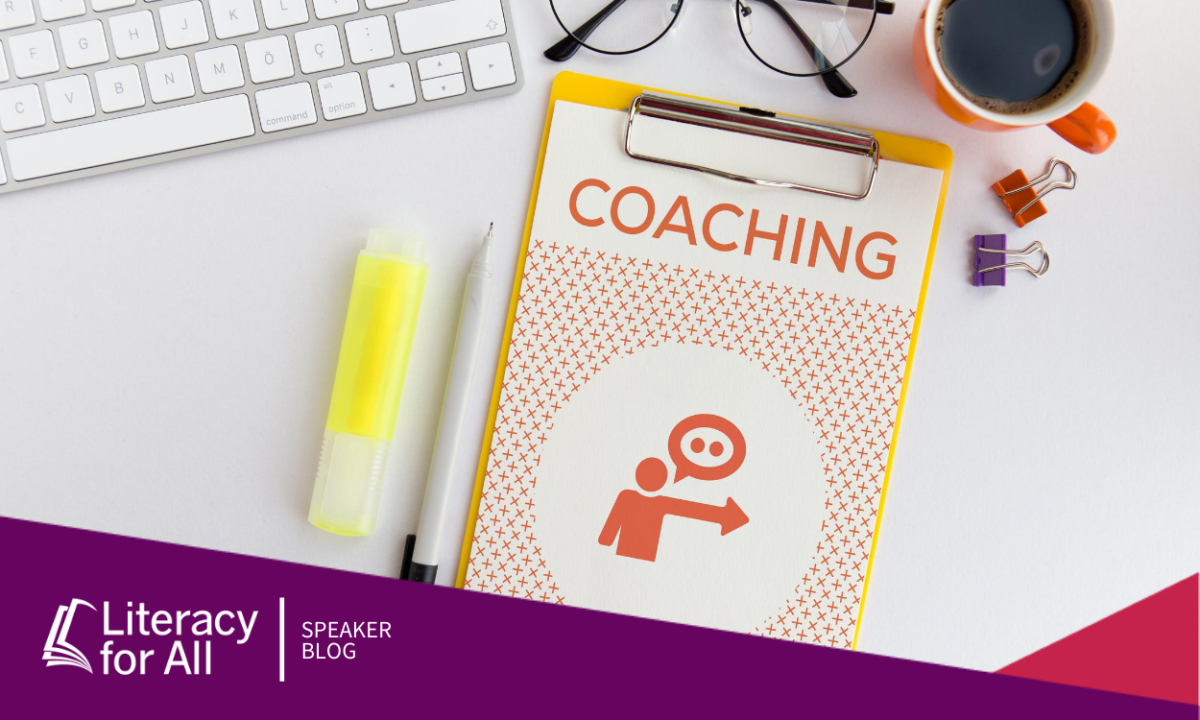Teachers are under stress, and literacy coaches know it. As school resumes, some teachers will again be facing the challenges of teaching online while others will be teaching in their schools and therefore attending to social distancing, disinfecting, and monitoring use of masks. In every situation this fall, teachers will be working with students who are also experiencing stress. What’s more, teachers are well aware that the threat of getting sick is real for themselves, their colleagues, their students, and students’ families. Where does a coach fit into all this?
I encourage literacy coaches to continue to think of themselves as teachers’ partners who collaborate in solving problems. Effective coach-teacher collaborations begin with the teacher: what is going on in the teacher’s classroom, what does the teacher perceive as student’s strengths and needs, and what obstacles to success is the teacher encountering? A good coach partner listens first and then walks the path of problem-solving alongside teacher colleagues.
In preparing to work with teachers this fall, it may help coaches to think about a time when they were under duress, using an example other than their current situation at school. By thinking of a time when they felt stress, say, from a family situation, a medical concern, or a difficulty in their community, coaches can develop a sense of empathy about what their teacher partners need right now.
I experienced such a situation just this week. I needed to go to the doctor due to a problem with “trigger finger” in my hand, in which one finger became painful and often froze. This happened to me a few years ago, and the solution was a very painful shot in the palm of my hand, something I experienced as so painful that I had to lie down in the doctor’s office afterward, to prevent myself from fainting. Today, then, I forecast another painful experience, made worse by my concerns about being in a medical clinic for a prolonged period of time during the COVID pandemic.
Fortunately, I have a great partner in my husband. He sat with me the night before the appointment and listened as I talked about my fears. Then, together, we problem-solved how I could make things go as well as possible. We reviewed safety precautions that I would take to protect myself from the virus, and we looked online to read about what the clinic was doing to protect patients. Additionally, my husband helped me plan what I would do about the painful shot, things like taking deep breaths, telling the doctor in advance about my previous difficulty with such a shot, and going outside the clinic to sit on a bench if I needed to recover.
My husband did a great job as a partner because he did these things:
- Tuned in when I told him I was struggling.
- Listened carefully.
- Asked open-ended questions.
- Avoided the urge to tell me what to do.
- Partnered with me in problem-solving.
- Helped me think of an additional resource (the clinic website) that could help.
Literacy coaches can do the same. They can be strong partners with teachers, especially teachers under duress, by tuning in, listening, asking good questions, and mutually collaborating to solve problems.
I suggest that coaching meetings should feel a little like going to a spa. Teachers should relax, enjoy the company of a trusted other, and leave feeling encouraged and empowered. This is true any time, but especially at a time when it is so challenging to be a teacher.
And, just as my husband’s support strengthened our relationship beyond helping me through the visit to the clinic, so should a meeting between coaches and teachers strengthen their relationship. Savvy coaches see every interaction as a chance to build trust and “grow” a partnership.
Oh, and I survived the shot just fine. ?

Dr. Cathy Toll supports teacher learning by helping educational coaches, professional learning teams, and school leaders to invest in teachers’ capacity to make a difference for students. She has published widely for teacher leaders, including six books for coaches and a book for learning leaders of all stripes. Cathy has served as a teacher at the elementary, middle, and high school levels, a reading specialist, a curriculum coordinator, a principal, director of literacy research and development, university professor, grant director, consultant, and of course, educational coach. She lives in Menasha, Wisconsin, with her husband David and their two cats.





